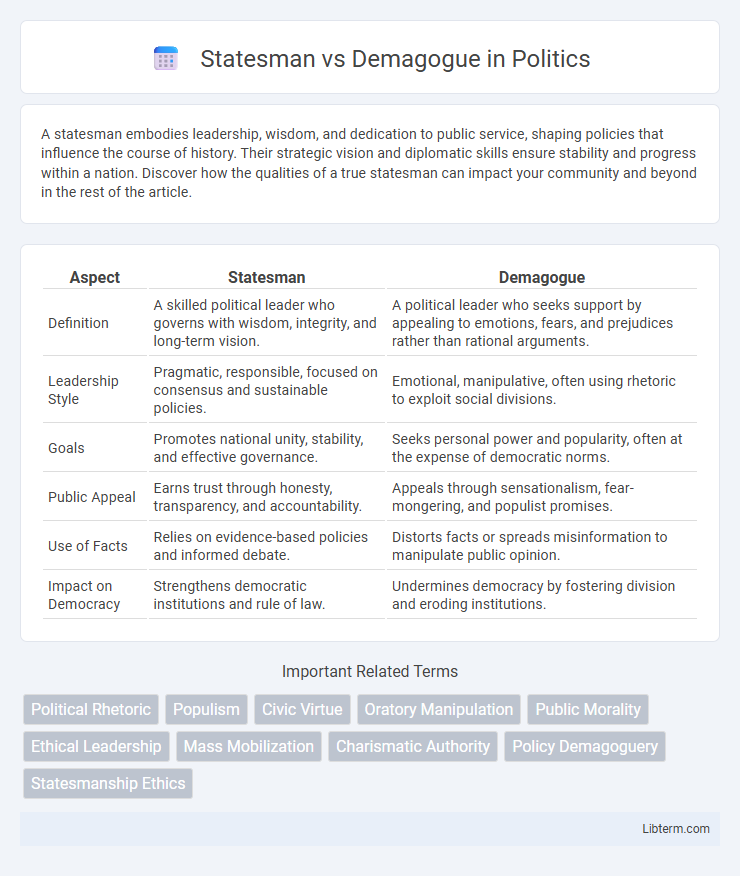A statesman embodies leadership, wisdom, and dedication to public service, shaping policies that influence the course of history. Their strategic vision and diplomatic skills ensure stability and progress within a nation. Discover how the qualities of a true statesman can impact your community and beyond in the rest of the article.
Table of Comparison
| Aspect | Statesman | Demagogue |
|---|---|---|
| Definition | A skilled political leader who governs with wisdom, integrity, and long-term vision. | A political leader who seeks support by appealing to emotions, fears, and prejudices rather than rational arguments. |
| Leadership Style | Pragmatic, responsible, focused on consensus and sustainable policies. | Emotional, manipulative, often using rhetoric to exploit social divisions. |
| Goals | Promotes national unity, stability, and effective governance. | Seeks personal power and popularity, often at the expense of democratic norms. |
| Public Appeal | Earns trust through honesty, transparency, and accountability. | Appeals through sensationalism, fear-mongering, and populist promises. |
| Use of Facts | Relies on evidence-based policies and informed debate. | Distorts facts or spreads misinformation to manipulate public opinion. |
| Impact on Democracy | Strengthens democratic institutions and rule of law. | Undermines democracy by fostering division and eroding institutions. |
Defining the Statesman and the Demagogue
A statesman embodies wisdom, integrity, and a commitment to the common good, guiding society through reasoned leadership and long-term vision. In contrast, a demagogue exploits emotions, fears, and prejudices to gain power, often prioritizing personal gain over public welfare. The statesman fosters unity and constructive dialogue, while the demagogue thrives on division and manipulation.
Historical Origins of Statesmanship and Demagoguery
Statesmanship traces its roots to ancient Greek philosophy and political practice, exemplified by leaders like Pericles who emphasized wisdom, ethical governance, and public good. Demagoguery emerged alongside collective decision-making in classical Athens, characterized by figures such as Cleon who exploited popular emotions and prejudices to gain power. The distinction between statesman and demagogue has evolved through centuries of political thought, reflecting contrasting approaches to leadership and civic responsibility.
Core Characteristics: Statesman vs. Demagogue
A statesman embodies integrity, vision, and a commitment to the common good, prioritizing long-term policy solutions and maintaining ethical leadership. In contrast, a demagogue exploits emotions, uses rhetoric to inflame divisions, and often prioritizes personal power over public welfare. The core characteristics distinguishing a statesman include rational decision-making and fostering unity, while a demagogue relies on manipulation and populist tactics to gain influence.
Motivations Behind Leadership Styles
Statesman leadership is motivated by a commitment to long-term societal welfare, guided by principles of integrity, empathy, and rational decision-making. Demagogues are driven by the desire for power and personal gain, often exploiting emotions, fears, and prejudices to manipulate public opinion. These contrasting motivations shape their approaches to governance, with statesmen prioritizing sustainable progress and demagogues seeking immediate influence through divisive tactics.
Influence on Public Opinion and Society
A statesman shapes public opinion through reasoned dialogue, ethical leadership, and long-term vision, fostering societal stability and trust in governance. In contrast, a demagogue exploits emotions, fear, and misinformation to manipulate public sentiment, often deepening divisions and undermining democratic institutions. The influence of a statesman promotes informed citizenry and collective progress, while a demagogue's tactics incite polarization and social unrest.
Ethical Foundations and Moral Compass
A statesman upholds ethical foundations by prioritizing the common good, guided by a strong moral compass rooted in integrity, fairness, and long-term societal welfare. In contrast, a demagogue often exploits emotions and prejudices, lacking a consistent moral framework, and prioritizes personal power over ethical governance. This divergence in ethical principles fundamentally separates their leadership approaches and societal impact.
Communication Tactics: Inspiration vs. Manipulation
Statesmen employ communication tactics that inspire trust and foster unity by appealing to shared values and presenting clear, reasoned visions for the future. In contrast, demagogues manipulate emotions, exploiting fear and division through inflammatory rhetoric and misleading information to gain power. Effective statesman communication prioritizes authenticity and constructive dialogue, whereas demagogic methods rely on deceit and polarization to control audiences.
Long-Term Impact on Governance and Policy
Statesmen prioritize long-term governance stability and sustainable policy development, fostering institutions that endure beyond electoral cycles. Demagogues emphasize short-term populist measures, often sacrificing policy coherence and institutional trust for immediate political gain. The enduring legacy of statesmen typically includes strengthened democratic norms and effective public administration, whereas demagogues risk eroding civic trust and institutional integrity, leading to volatile governance outcomes.
Famous Examples: Statesmen and Demagogues in History
Winston Churchill exemplifies a statesman through his leadership during World War II, maintaining resolve and inspiring unity amid crisis. In contrast, Adolf Hitler is a notorious demagogue, manipulating public emotions and spreading propaganda to gain and consolidate power. Other notable statesmen include Abraham Lincoln, who preserved the Union and championed emancipation, while demagogues like Joseph McCarthy exploited fear and paranoia during the Red Scare to advance personal agendas.
Choosing Leaders: Lessons for Modern Democracies
Statesman leaders prioritize the common good, embodying wisdom, integrity, and long-term vision essential for sustainable governance in modern democracies. Demagogues exploit emotions, spreading misinformation to gain power, undermining democratic institutions and social cohesion. Electorates must critically evaluate candidates' values, policies, and track records to safeguard democratic principles and promote responsible leadership.
Statesman Infographic

 libterm.com
libterm.com